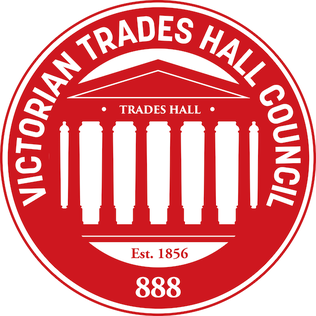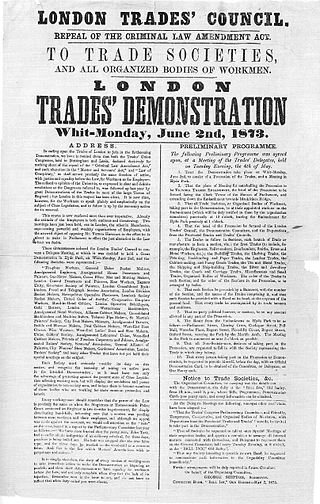
The Scottish Trades Union Congress (STUC) is the national trade union centre in Scotland. With 40 affiliated unions as of 2020, the STUC represents over 540,000 trade unionists.
Industrial unionism is a trade union organising method through which all workers in the same industry are organized into the same union, regardless of skill or trade, thus giving workers in one industry, or in all industries, more leverage in bargaining and in strike situations.

The Australian Council of Trade Unions (ACTU), originally the Australasian Council of Trade Unions, is the largest peak body representing workers in Australia. It is a national trade union centre of 46 affiliated unions and eight trades and labour councils. The ACTU is a member of the International Trade Union Confederation.

The National Union of Rail, Maritime and Transport Workers is a British trade union covering the transport sector. Its current President is Alex Gordon and its current General Secretary is Mick Lynch.
The Australian labour movement began in the early 19th century and since the late 19th century has included industrial and political wings. Trade unions in Australia may be organised on the basis of craft unionism, general unionism, or industrial unionism. Almost all unions in Australia are affiliated with the Australian Council of Trade Unions (ACTU), many of which have undergone a significant process of amalgamations, especially in the late 1980s and early 1990s. The leadership and membership of unions hold and have at other times held a wide range of political views, including socialist, democratic and right-wing views.
The Australian Workers' Union (AWU) is one of Australia's largest and oldest trade unions. It traces its origins to unions founded in the pastoral and mining industries in the late 1880s and it currently has approximately 80,000 members. It has exercised an outsized influence on the Australian Trade Union movement and on the Australian Labor Party throughout its history.

The Victorian Trades Hall Council (VTHC) is a representative body of trade union organisations, known as a labour council, in the state of Victoria, Australia. It comprises 43 affiliated trade unions and professional associations, and eight regional Trades and Labour Councils of Victoria.

The Queensland Council of Unions (QCU) is a representative, an advocacy group, or peak body, of Queensland trade union organisations, also known as a labour council, in the Queensland, Australia. As of 2020, 26 unions and 13 regional branches were affiliated with the QCU. The QCU represents unions covering around 350,000 Queensland workers. It is affiliated with the Australian Council of Trade Unions (ACTU). Its offices are located in the suburb of South Brisbane, Queensland. As a peak body for the Queensland trade unions, the objective of the QCU is to achieve industrial, social and political justice for Queensland workers. The management structure of the QCU is made up of a committee of management and an executive of representatives comprised from affiliated unions.
SA Unions is the peak body for trade unions in South Australia. It coordinates political, social, economic, and industrial campaigns between its affiliate members and implements the policies of the Australian Council of Trade Unions in South Australia.

The Sheffield Trades and Labour Council, usually known as the Sheffield Trades Council, is a labour organisation uniting trade unionists in Sheffield.

The Irish Trades Union Congress (ITUC) was a union federation covering the island of Ireland.

The Labor Council of New South Wales, branded Unions NSW, is the peak body for trade unions in the state of New South Wales, Australia. As of 2005 there are 67 unions and 8 Rural and Regional Trades & Labor Councils affiliated to the Labor Council, representing 800,000 workers in NSW. It is registered as the State Peak Council of Employees under Section 215 of the Industrial Relations Act 1996 (NSW). The council is affiliated with the Australian Council of Trade Unions (ACTU).

The Ghana Trades Union Congress is a national centre that unites various workers' organizations in Ghana. The organization was established in 1945.

The Trades Union Congress (TUC) is a national trade union centre, a federation of trade unions that collectively represent most unionised workers in England and Wales. There are 48 affiliated unions with a total of about 5.5 million members. Paul Nowak is the TUC's current General Secretary, serving from January 2023.

The London Trades Council was an early labour organisation, uniting London's trade unionists. Its modern successor organisation is the Greater London Association of Trades (Union) Councils
Glasgow Trades Council is an association of trade union branches in Glasgow in Scotland.

The Manchester Trades Union Council brings together trade union branches in Manchester in England.
The Bristol Trades Council is a trades council representing workers in Bristol in England.
The South African Trades and Labour Council (SAT&LC) was a national trade union federation in South Africa.











